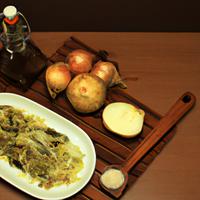
1 serving (100 grams) contains 23 calories, 1.7 grams of protein, 0.3 grams of fat, and 4.1 grams of carbohydrates.

Log this food in SnapCalorie

Nutrition Information
Calories |
54.8 | ||
|---|---|---|---|
% Daily Value* |
|||
| Total Fat | 0.7 g | 0% | |
| Saturated Fat | 0.1 g | 0% | |
| Polyunsaturated Fat | 0 g | ||
| Cholesterol | 0 mg | 0% | |
| Sodium | 107.1 mg | 4% | |
| Total Carbohydrates | 9.8 g | 3% | |
| Dietary Fiber | 8.6 g | 30% | |
| Sugars | 1.2 g | ||
| protein | 4.0 g | 8% | |
| Vitamin D | 0 mcg | 0% | |
| Calcium | 238.1 mg | 18% | |
| Iron | 4.3 mg | 23% | |
| Potassium | 1000 mg | 21% | |
* Percent Daily Values are based on a 2,000 calorie diet. Your daily values may be higher or lower depending on your calorie needs.
Food Attributes
Source of Calories
About Cicoria
Cicoria, also known as Italian chicory or dandelion greens, is a nutrient-rich leafy vegetable prized in Mediterranean cuisine. With its slightly bitter flavor, it’s a staple in Italian cooking, commonly sautéed with olive oil, garlic, and chili flakes or used in salads and soups. Cicoria is packed with vitamins A, C, and K, along with minerals like calcium and potassium, which support bone health, immunity, and cardiovascular function. It’s also a good source of fiber, aiding digestion and promoting satiety. Additionally, cicoria contains antioxidants that combat free radicals and contribute to overall health. While highly nutritious, its sharp bitterness may require proper preparation to suit some palates. Low in calories and fat-free, cicoria makes an excellent addition to a balanced diet, particularly in plant-based or heart-healthy meal plans.



